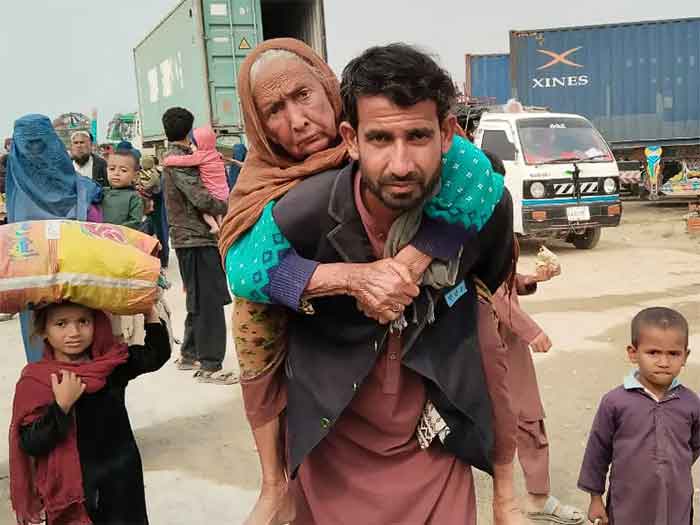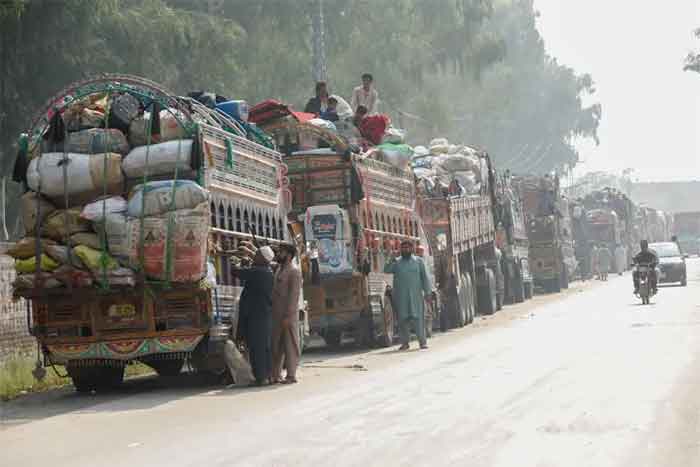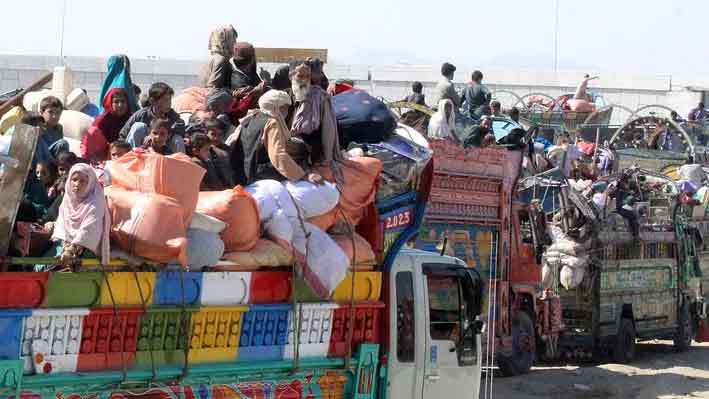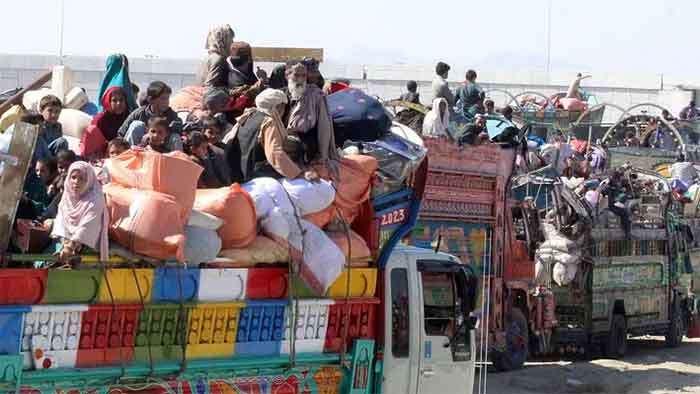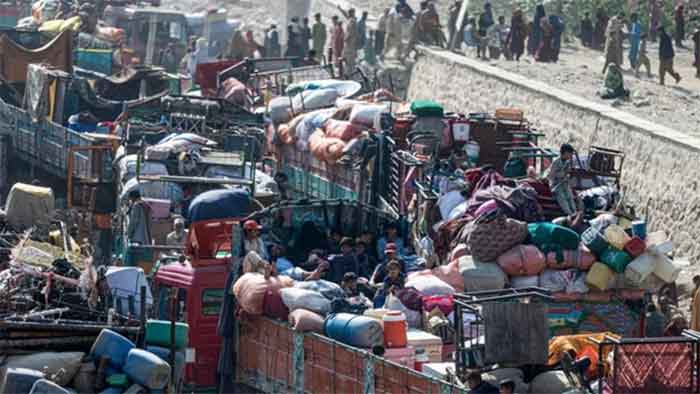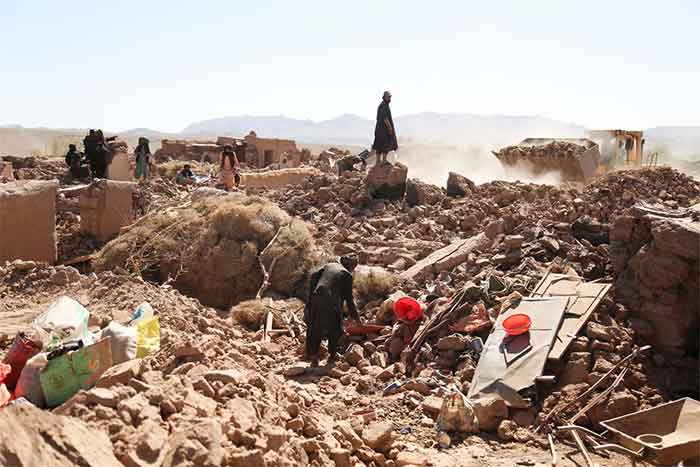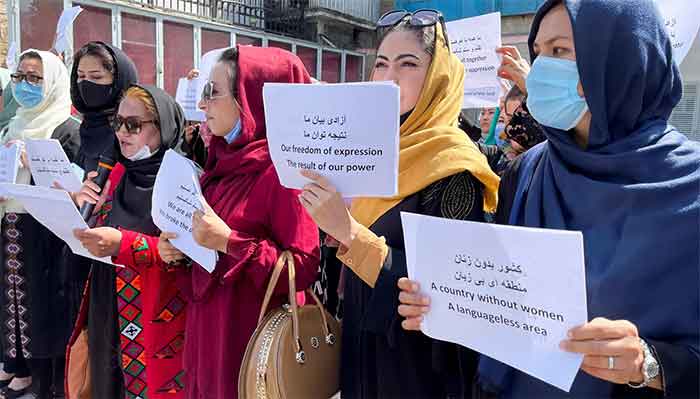
The situation in Afghanistan is yet to calm down. Women are facing hard time and threats. The Taliban are also wearing down with problems of governance.
Internal Divisions, Even Resentment
A Christian Science Monitor report, ‘Why did we fight?’ Challenge of governing is wearing down Taliban, by Scott Peterson on October 21, 2021 said:
“The veteran Taliban fighter once strove for martyrdom on the Afghan battlefield of what he considered an Islamic revolution.
“But the Taliban insurgency’s lightning victory in August has yet to bring a long-promised paradise, says Rahmatullah. Instead, he fears, it is revealing internal divisions, even resentment.
“‘We struggled and fought in extreme poverty. Now our leaders are ruling and have luxury cars and lots of facilities, but the majority of mujahideen do not have salaries and their families are worse off,’ says the fighter, who uses one name.
“‘Some of the lower echelons of the mujahideen are now wondering, “What was the benefit of our struggle, and why did we fight?”’”
The report said:
The Taliban are fast finding that winning a war is easier than governing, say analysts, and are overwhelmed by the challenge of feeding and ensuring services to some 40 million people.
The transition to governing has been made more difficult by the shut-off of critical cash from Western donors – money that propped up Kabul governance for years – as well as widespread drought and displacement, as winter approaches.
With no cash and no plan, a multitude of rifts are emerging among the Taliban. And they are already breeding resentment – between regions, between haves and have-nots as they tussle over the spoils of victory, and between those who dreamed of an Islamic revolution but are getting a power grab by a movement that never thought through the basics of ruling an entire nation.
“There is a clear understanding among the leadership that it is way more problematic than they thought it would be, so right now they are under pressure to control their own men,” says Rahmatullah Amiri, a Kabul-based independent expert on the Taliban.
The Achilles’ heel of Taliban rule may not be the threat from militants like Islamic State, he says, but how the dangers of mass hunger and a failing economy might exacerbate intra-Taliban divisions and spark broader discontent.
“The biggest thing they did not think about is the economy,” says Mr. Amiri, noting the importance of Western donor funds resuming. “This is way beyond their imagination, way beyond their capacity to understand.”
It’s no longer just about residents of rural and often remote areas under insurgent Taliban control, he says. “It’s about millions and millions of people.”
Leaders’ Promises and Disputes Over Confiscated Vehicles and Property
The report added:
“When the Monitor first met Rahmatullah in February 2020 – the day after he had helped blow up a nearby bridge – the fighter whose nom de guerre of Mullah Sarbakhod means one who rushes forward wildly, without thinking, was already expressing distrust of Taliban chiefs, ‘if they prefer money or promotions to the dangers of the front line.’
Interviewed this week in Wardak province, southwest of Kabul, he cites frequent disputes over confiscated vehicles and property, and instances where Taliban from southern provinces like Kandahar and the Haqqani network tell groups like his, from Wardak, to leave the capital and “return to their villages,” sowing resentment as they impose their own grip on power.
“I am sure if they do not solve these problems, dissatisfaction will arise and lead to conflict in the future. Maybe some of the Taliban will change their ways, and leave the Taliban forever,” says the fighter. “Now is the time for our leaders to live up to their promises to the Afghan nation.”
Failure to meet expectations – among Taliban faithful and civilians alike – could lead to an unraveling for the jihadis, who are already deeply unpopular in many provinces, and often thin on the ground.
“They do not have the means to provide economic improvements to the community, and people get hungry,” says Mr. Amiri. “Crime will increase. A time could come when people will take arms against them because of lack of jobs.”
A Father’s Story: We Stole From People’s Houses
The report said:
That would not surprise the father of Mullah Zahid, a 22-year-old former Taliban fighter who joined the insurgency at the age of 16 in Wardak province but today exemplifies how some true believers have been forced to steal to get by.
According to his father, Mullah Zahid said, “The Taliban promised us that after victory they would give important positions; everyone will be paid a good salary.” But the son received no money while deployed in Kabul, and ate only bread and water, recounts the father, who was contacted in Kabul and asked not to be named.
Mullah Zahid told him: “There was nothing to eat, so we started stealing because there was no other option. Several times we stole from people’s houses, and it was a big shame for us to threaten people to pay us. Also, we stole computers from government offices and sold them in the bazaar, and sold our weapons, for food money.”
Such moves were once unthinkable, from a group that made its name imposing harsh punishments like amputating the hands of thieves.
Luxury Cars and Homes: Fights for Money and Power
It said:
When Mullah Zahid asked Taliban officials to pay for food, he was told to keep waiting. “We saw they had luxury cars and homes; they had a lot of money and enough food, but we were always hungry,” his father quoted him as saying.
Last week, Mullah Zahid left the Taliban and went to Iran, in search of work.
“There was no jihad,” says the father. “The Taliban fights for money and power, but our sons give big sacrifices. We will never forgive them.”
“An ill-thought-out power grab”
The Taliban struggle to satisfy a population dramatically changed since they last ruled Afghanistan 20 years ago.
The report said:
“A lot of Afghans have concluded it is not an Islamic revolution; it is an ill-thought-out power grab, which rather delegitimizes the Taliban,” says Michael Semple, an Afghanistan expert at Queen’s University Belfast and former adviser to the European Union in the country.
Another abiding impression among Afghans is that the Taliban “are steeped in their clannishness,” and used their power grab “to distribute the fruits of victory within their own very well-defined circles, so there is no issue of serving the population,” says Mr. Semple.
One scenario Afghans suggest is that “the sheer inability of the Taliban to cope … means they really would not survive more than six months – I think that has to be taken seriously,” he says.
Yet, whether or not an overthrow is even feasible, the “basic point is the current Taliban administration is incredibly, inherently fragile, for now,” Mr. Semple says. “There is nothing inevitable about the Taliban remaining in power in this form.”
Recognizing that risk for themselves, the Taliban “really are moving fast to deploy an authoritarian apparatus to try and snuff out all forms of resistance, civil or military, before they really take hold,” says Mr. Semple.
The Taliban are finding that they control far fewer variables than they once did, when they could count on widespread anger about the foreign military presence, corruption in Kabul, and their Islamist message to fill their ranks.
Despise Wardakis
The report added:
Suleiman Roostami, a long-bearded and young-faced Taliban district commander in Wardak, is hopeful that his years of fighting were not in vain, and that Taliban chiefs “will give the rights to all people, including women.”
At the same time, he voices concern that the quest for power by some in the Taliban will overshadow their obligation to improve the lives of the Afghan people.
When the Monitor first met Mr. Roostami in early 2020, he noted the futility of continued war – a realization that stemmed from an attack by his unit on a police post. A dozen people died in that clash, but nothing changed. He expressed the hope then that both his young sons and daughters could all be educated.
But now he tells how his unit, among the first to enter Kabul, was forced to hand over vehicles, captured facilities, and heavy weapons to Taliban from Kandahar and the Haqqani network. They “despise” Wardakis, he says, and “are seeking to gain more power … which may become a big problem in the future [and] very bad for the Taliban.”
Also important is “social justice” for fighters who have sacrificed for years, he says. Failure to provide that could mean most regional Afghan warlords “will be against the Taliban, and it will pave the way for a new conflict and war,” says Mr. Roostami.
Taliban leaders should also improve citizens’ quality of life, says Mr. Roostami. “If they don’t pay attention to this, I am sure all the nation will be against us.”
Hidayatullah Noorzai and a correspondent in Maydan Shar, Wardak province, contributed reporting for this report.
Taliban Praise Suicide Bombers, Offer Families Cash and Land
Other media reports from Kabul said:
The Taliban praised suicide bombers who died during the war against the former government and its Western allies and offered their families sums of cash and promises of land, the movement’s interior ministry said in a statement.
Sirajuddin Haqqani, the acting interior ministry who has a $10 million U.S. bounty on his head as a “specially designated global terrorist”, met the families at a ceremony at the Intercontinental Hotel in Kabul, which was itself targeted by suicide bombers in 2018.
Official photographs of the meeting on Tuesday obscured his face.
“In his speech, the minister praised the Jihad and sacrifices of the martyrs and Mujahidin and called them heroes of Islam and the country,” the ministry said in a statement on Twitter.
Families of the suicide bombers were given clothing, 10,000 afghani ($111) and promised plots of land, spokesman Qari Sayeed Khosti said.
“Now you and I must refrain from betraying the aspirations of our martyrs,” Haqqani said, according to Khosti.
The event comes as the interim Taliban government attempts to find its footing in Afghanistan. The gesture is a contrast from the group’s efforts to gain global support as the country’s new rulers.
Female Judges in Afghanistan, Now Jobless and in Hiding
A report by The New York Times said:
When Nabila was a judge in Afghanistan’s Supreme Court, she granted divorces to women whose husbands were sometimes jailed for assaulting or kidnapping them. Some of the men threatened to kill her after they had served their time, she said.
In mid-August, as the Taliban poured into Kabul and seized power, hundreds of prisoners were set free. Men once sentenced in Nabila’s courtroom were among them, according to the judge. Like the other women interviewed for this story, her full name has been withheld for her protection.
Within days, Nabila said, she began receiving death threat calls from former prisoners. She moved out of her house in Kabul and went into hiding as she sought ways to leave Afghanistan with her husband and three young daughters.
“I lost my job and now I cannot even go outside or do anything freely because I fear these freed prisoners,” Nabila said by phone from a safe house. “A dark future is awaiting everyone in Afghanistan, especially female judges.”
More than 200 female judges remain in Afghanistan, many of them under threat and in hiding, according to the International Association of Women Judges. Taliban officials have recovered their personal information from court records, several former judges said, and some have had their bank accounts frozen.
“They are women who had the effrontery to sit in judgment on men,” said Susan Glazebrook, president of the judges’ association and a justice of the Supreme Court in New Zealand.
“The women judges of Afghanistan are under threat for applying the law,” she added. “They are under threat because they have made rulings in favor of women according to law in family violence, custody and divorce cases.”
The plight of female judges and lawyers is one more example of the Taliban’s systematic unraveling of gains made by women over the past two decades. Female judges and lawyers have left the courts under Taliban pressure, abruptly erasing one of the signal achievements of the United States and allied nations since 2001.
The women have not only lost their jobs, but also live in a state of perpetual fear that they or their loved ones could be tracked down and killed.
“Afghanistan is an open-air prison for these women,” said Kimberley Motley, an American lawyer who has worked in Afghanistan for several years. She said she is representing 13 female lawyers and judges who are trying to leave the country.
A Taliban spokesman, Bilal Karimi, said no decision had been made about a future role for female judges and lawyers.
“Right now, they are on hold,” Karimi said.
But the judges and lawyers say they have been effectively fired because it is too dangerous for them to continue their work, given the Taliban’s disapproval of women who sit in judgment of men.
“Women judging men is anathema to the Taliban,” Glazebrook said.
Before the Taliban takeover, more than 270 female judges served in Afghanistan’s corrupt, male-dominated justice system. Special courts with female judges, along with special police units and prosecution offices, were set up in many places to handle cases of violence against women. A little more than a decade ago, nearly 90% of women experienced some form of domestic abuse in their lifetime, according to a 2008 study by the U.S. Institute of Peace.
These judges helped to bring some reform to many courts, particularly in urban areas, delivering justice to growing numbers of women and girls beaten and abused by husbands or male relatives.
The women defied a legal system that favored husbands, granting divorces to Afghan wives who in many cases would previously have been doomed to stay in abusive marriages. Among those now in hiding are former lawyers and judges who defended abused women or pursued cases against men accused of beating, kidnapping or raping women and girls.
Now many former judges and lawyers said their relatives or neighbors have been beaten or accosted by men demanding to know the women’s whereabouts.
“We have lost everything — our jobs, our homes, the way we lived — and we are terrified,” said Wahida, 28, a former judge.
Behista, 25, a former defense lawyer who represented victims of domestic abuse, said she had not left her home in Kabul since the Taliban takeover on Aug. 15. She is trying to leave Afghanistan with her mother and two brothers, one of them a former government soldier, she said.
“I lost my job, and now my whole family is at risk, not just me,” Behista said.
Nabila said she continued to receive threats even after replacing the SIM card in her cellphone.
Even before the Taliban takeover, female judges and lawyers were sometimes threatened or attacked. In January, two female judges on the Afghan Supreme Court were shot and killed on their way to work in Kabul.
Male judges and police officers often resisted reforms to the justice system, and pressured women to rescind their complaints from the court. A Human Rights Watch report released in August said the system had failed to provide accountability for violence against women and girls and had undermined progress to protect women’s rights.
The report said landmark legislation passed in 2009, the Elimination of Violence Against Women law, was often sabotaged by male officials despite some progress in bringing justice to victims under the law.
Now, many female former judges and lawyers who were responsible for this progress are not able to evacuate because they do not have national ID cards or passports, said Motley, the American lawyer. According to the World Bank, more than half of all Afghan women lack national ID cards compared with about 6% of men. And for many of the women who do have documents, their efforts to escape are complicated by a husband or child who does not.
Some female judges and lawyers have managed to escape Afghanistan. Polish authorities recently helped 20 women and their families leave, Glazebrook said, and 24 female judges have been evacuated to Greece since August, according to the Greek foreign ministry.
Friba, 40, was an appeals court judge from Mazar-i-Sharif, a city in Afghanistan’s north, before she fled to Greece. She has convicted numerous men for domestic violence and also presided over the trial of two Taliban members found guilty for the November 2016 suicide bomb attack on the German consulate.
“I was getting threats for the past five years,” Friba said.
In 2014, she secured a divorce for her sister who had been forced to marry a Talib at age 17 under the movement’s first regime. Her sister has since fled to Egypt with their three children. “He is still after her,” she said.
Karimi, a member of the Taliban cultural commission, denied that the former judges and lawyers were at risk. He said they were covered by a general amnesty for all Afghans who served the previous government.
Glazebrook rejected this.
“These women believed in their country, believed in human rights and believed in the importance of the rule of law and their duty to uphold it,” she said.
As a result, she said, “They are at risk of losing their lives.”
Afghan Women Appeal: Do not let Taliban in
A Reuters report said:
A group of Afghan women urged the UN to block the Taliban from gaining a seat at the world body, calling for better representation for their country during a visit to the organization’s New York headquarters on Thursday.
“It’s very simple,” former Afghan politician and peace negotiator Fawzia Koofi told reporters outside the UN Security Council in New York. “The UN needs to give that seat to somebody who respects the rights of everyone in Afghanistan.”
“We are talked a lot about, but we are not listened to,” she said of Afghan women. “Aid, money, recognition – they are all leverage that the world should use for inclusion, for respect to the rights of women, for respect to the rights of everybody.”
Koofi was joined by former politician, Naheed Fareed, former diplomat Asila Wardak and journalist Anisa Shaheed.
“When the Taliban took Afghanistan … they said that they will give permission to women to resume their jobs, to go back to the school, but they did not keep that promise,” said Fareed.
Since seizing power in mid-August, Taliban leaders have vowed to respect women’s rights in accordance with sharia, or Islamic law.
The UN is considering rival claims on who should represent Afghanistan. The Taliban nominated their Doha-based spokesman Suhail Shaheen as UN ambassador, while Ghulam Isaczai – the UN envoy representing the government ousted by the Taliban – is seeking to remain in the country’s seat.
UN member states are expected to make a decision by the end of the year.
Wardak urged countries to pressure the Taliban “to put their words in action” when it comes to women’s rights, adding: “If you’re going to give them a seat, there should be conditions.”
The women spoke to reporters before addressing a UN event on support for Afghan women and girls, organized by Britain, Qatar, Canada, UN Women and the Georgetown Institute for Women, Peace and Security.
The UN Security Council also met separately on Thursday to discuss women, peace and security.
“Women and girls in Afghanistan are pinning their hopes and dreams on this very council and world body to help them recover their rights to work, travel and go to school,” Isaczai told the 15-member council. “It would be morally reprehensible if we do nothing and let them down.”
From Exile, Female Former Afghan Leader Keeps Fighting
An AP report said:
Two months after the Taliban seized power in Afghanistan, one of the country’s once-prominent female leaders — a former parliament member, candidate for president and a nominee for the Nobel Peace Prize — is visiting the UN, not as a representative of her government but as a woman in exile.
In an interview with The Associated Press, Fawzia Koofi called for humanitarian aid sent to Afghanistan to be contingent on the participation of women in its distribution, as well as free and safe travel for Afghans into and out of the country.
Aid “should not be politicized. … Women should be involved in every stage of it and they should be listened to. Women should not be only the recipients,” said Koofi, part of a delegation of Afghan women visiting the U.N. to urge member states not to compromise on inclusion and equal rights in Afghanistan.
Since fleeing Kabul in August, Koofi has been living in hotel rooms in Europe. She described the pain of separation from her country, of two decades of hopes dashed and of searching for permanent residence for herself and her two daughters.
“This is not an Afghanistan I fought for,” she told the AP. “The Afghanistan that I was hoping for was (that) women should not suffer as much as I suffered during my childhood, during the time that I was a teenager, when (the) Taliban took over.”
“I wanted other girls to enjoy at least the freedom of choosing which school they should go. But now, their choice is limited to which room in their houses they should spend during the day. This is heartbreaking.”
Koofi, a former deputy speaker of parliament, was one of only four women in talks to reach a power-sharing deal with the Taliban, which ultimately failed. She described watching the Taliban’s commitment to negotiations change after they signed a peace agreement with the U.S. in February 2020.
“After they signed the agreement, they were more extreme and they were more into buying time, preferring a military strategy,” she said.
She also blamed “world leaders,” seeming to point a finger at U.S. President Joe Biden. “As a superpower, the U.S. has a major responsibility and should be held accountable,” she said.
Koofi said she thinks the breakdown of peace talks and the Taliban takeover could have been avoided. Pausing as tears ran down her face, she said: “I mean, every day we are actually dealing with this trauma.”
Her former female colleagues in parliament, female judges who used to sentence people affiliated with the Taliban and some journalists who spoke out against the group are now fearful, she said.
The Taliban must also be held accountable, she added, for their pledges that women would be able to go to school and work “within the principles of Islam.”
Each day, Koofi said she gets hundreds of text and voice messages largely from women still in Afghanistan, hoping she can help them.
“They’re very angry … that I am not with them at these difficult times,” she said. “The women, especially, they keep sending me messages expressing their anger that, you know, ‘We need you to be here with us in the streets of Kabul,’ and they are right.”
Women she used to work with and who were the breadwinners in their families send her photos of themselves as reminders.
“Psychologically to process this and to be able to adjust and accept, it’s not been easy,” she said. “Not only for me, for every woman and man that I have met in the last two months after I left Kabul.”
For now, Koofi is focused on resolving residency status for herself and her daughters, ages 22 and 23. For security reasons, she declined to say where.
“If we think that one military extremist group, which is Taliban, is going to defeat Daesh — it’s not going to work that way,” she said.
“You need to continue to empower the nation, empower the people, educate them, support the political process.”
UN Sets Up Trust Fund for ‘People’s Economy’ in Afghanistan
The UN said on Thursday it had set up a special trust fund to provide urgently needed cash directly to Afghans through a system tapping into donor funds frozen since the Taliban takeover in August.
With the local economy “imploding”, the aim is to inject liquidity into Afghan households to permit them to survive this winter and remain in their homeland, it said.
Achim Steiner, the UN Development Programme’s (UNDP) administrator said Germany, a first contributor, had pledged $58 million to the fund, and that it was in touch with other donors to mobilize resources.
Some 97% of Afghan households could be living below the poverty line by mid-2022, according to UNDP.
“We have to step in, we have to stabilize a ‘people’s economy’ and in addition to saving lives we also have to save livelihoods,” Steiner told a news briefing.
“Because otherwise we will confront indeed a scenario through this winter and into next year where millions and millions of Afghans are simply unable to stay on their land, in their homes, in their villages and survive,” he said.
The International Monetary Fund said on Tuesday that Afghanistan’s economy was set to contract up to 30% this year and this was likely to further fuel a refugee crisis that would affect neighboring countries, Turkey and Europe.
Although humanitarian aid has continued banks are running out of money, civil servants have not been paid and food prices have soared.
Steiner said the fund allows the international community to be “confident enough that these funds are not meant as government-to-government funding.”
The UN has discussed the programs with the Taliban, he said, noting that 80% of the micro-businesses being helped were led by women.
“Our greatest challenge right now is that there is a economy in which there is virtually no domestic currency in circulation,” Steiner said, adding that the UN wanted to avoid foreign currencies dominating, which would undermine the economy.
“Our intent is to find ways very quickly in which we can convert international support into local currency in order to be able to stimulate local markets, local livelihoods. This is how you keep an economy alive,” he said.
Kanni Wignaraja, director of UNDP’s regional bureau for the Asia Pacific, said that cash would be provided to Afghan workers in public works programs, such as drought and flood control programs, and grants given to micro-enterprises. Temporary basic income would be paid to the vulnerable elderly and disabled, she said.
Pakistan Foreign Minister Makes First Trip to Kabul since Taliban Takeover
A Reuters report said:
Pakistani Foreign Minister Shah Mahmood Qureshi visited the Afghan capital Kabul on Thursday for the first time since the Taliban victory in August, following weeks of tension over transport links between the neighboring countries.
The visit comes after prolonged problems at the Chaman border crossing, one of the main trade transit points between Afghanistan and Pakistan, which has been closed for more than two weeks, causing severe problems for truckers and exporters.
Qureshi said Pakistan was determined to help Afghanistan avoid a collapse of its economy and had agreed measures to ease some border restrictions and facilitate trade, including on-arrival visas for Afghan business travelers.
Imports of fresh fruit and vegetables from Afghanistan would also be allowed duty free, Qureshi said, in a move aimed at helping Afghan fruit producers hurt by the border closures.
Farmers near the southern city of Kandahar have been forced to leave pomegranates and other export produce to rot because trucks cannot get through to their markets across the border.
But there was no agreement to restart flights by Pakistan International Airlines, which suspended operations from Kabul last week after it accused Taliban officials of interference.
The airline has faced local anger after it raised the price of a one-way ticket to as much as $2,500, citing the cost of the premiums it was forced to pay for operating in what insurers consider a war zone.
Qureshi’s delegation on Thursday included the head of the ISI intelligence service, Faiz Hameed, who had also visited Kabul in the immediate aftermath of the fall of the city.

